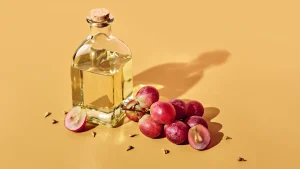
Natural remedy: grapeseed oil. Because it contains a lot of antioxidants including vitamin E, linoleic acid, and polyphenols, grapeseed oil is used as a natural cure for skin and hair care. All skin types, especially oily and acne-prone skin, can benefit from its non-greasy, lightweight texture, which also helps to hydrate, decrease inflammation, even out skin tone, and fight aging signs. Additionally, it can be used to moisturize hair and relieve irritated skin.
NATURAL REMEDY: GRAPESEED OIL
Nutrient-dense and multipurpose, grapeseed oil has several health and cosmetic advantages. Grapeseed oils are a great complement to any natural health and beauty routine since they hydrate and nourish the skin, support heart health, fight aging signs, promote hair health, and reduce inflammation. A healthier lifestyle and enhanced well-being can result from incorporating the oil into your everyday routine.
1. Skin Health and Hydration;

NATURAL REMEDY: GRAPESEED OIL
Grapeseed oil is an excellent moisturizer, suitable for all skin types. It is rich in vitamin E and essential fatty acids, which help to hydrate and nourish the skin, making it soft and smooth. The oil’s light texture allows it to be easily absorbed without clogging pores, making it ideal for acne-prone skin. Its anti-inflammatory properties can also help soothe and heal irritated skin conditions like eczema and dermatitis.

NATURAL REMEDY: GRAPESEED OIL
The high concentration of antioxidants in grapeseed oil, particularly proanthocyanidins, helps combat the signs of aging. These antioxidants neutralize free radicals that can damage skin cells, reducing the appearance of fine lines, wrinkles, and age spots. Regular application of grapeseed oil can improve skin elasticity and firmness, promoting a youthful and radiant complexion.
3. Hair Health and Shine;
Grapeseed’s oil is beneficial for hair care, providing deep conditioning and nourishment. It helps to strengthen hair strands, reduce breakage, and promote healthy hair growth. Applying grapeseed oil to the scalp can help alleviate dandruff and dryness, while its light, non-greasy texture leaves hair soft, shiny, and manageable.
4. Heart Health;

NATURAL REMEDY: GRAPESEED OIL
Grapeseed’s oil is rich in polyunsaturated fats, including omega-6 fatty acids, which are beneficial for heart health. These fats help to lower bad cholesterol (LDL) levels and improve good cholesterol (HDL) levels, reducing the risk of heart disease. Additionally, the oil contains antioxidants like resveratrol, which support cardiovascular health by reducing inflammation and improving blood circulation.
5. Anti-Inflammatory and Antimicrobial Properties;
Grapeseed’s oil possesses anti-inflammatory and antimicrobial properties, making it effective in promoting overall health. These properties can help reduce inflammation in the body, which is linked to chronic diseases such as arthritis and cardiovascular conditions. When applied topically, grapeseed oil can aid in the healing of minor wounds, cuts, and acne, preventing infections and promoting faster recovery.
How to Use Grapeseed Oil;

– Skin Care: Apply a few drops of grapeseed oil directly to the skin as a moisturizer, or mix it with your favorite skincare products. It can also be used as a gentle makeup remover.
– Hair Care: Massage grapeseed’s oil into the scalp and hair, leave it on for 30 minutes to an hour, then rinse thoroughly for smooth, shiny hair.
– Dietary Use: Use grapeseed oil in salad dressings, marinades, or for sautéing vegetables. Its mild flavor makes it a versatile cooking oil.
Summary
Extracted from grape seeds, grapeseed oil is a nutrient-rich, lightweight oil with a host of health and cosmetic advantages. Rich in vitamins, healthy fats, and antioxidants, this multipurpose oil is a favorite for personal care and cooking.